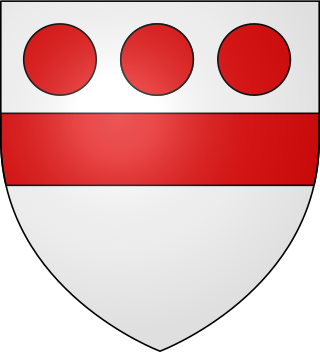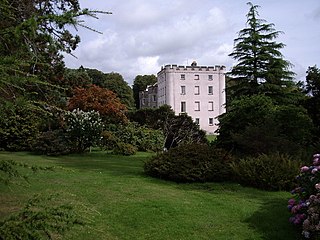Related Research Articles

Viscount St Davids, of Lydstep Haven in the County of Pembroke, is a title in the Peerage of the United Kingdom. It was created in 1918 for John Philipps, 1st Baron St Davids. The Philipps family descends from Sir John Philipps, who represented Pembrokeshire in the House of Commons. In 1621 he was created a Baronet, of Picton Castle in the County of Pembroke, in the Baronetage of England. His grandson, the third Baronet, also sat as Member of Parliament for Pembrokeshire. He was succeeded by his son, the fourth Baronet. He represented Pembroke and Haverfordwest in Parliament. His son, the fifth Baronet, sat for Haverfordwest. He was succeeded by his younger brother, the sixth Baronet. He represented Carmarthen, Petersfield and Pembrokeshire in the House of Commons.

Sir Thomas Myddelton (1586–1666) of Chirk Castle, Denbighshire, was an English-born Welsh landowner, politician, and military officer. He became a Member of Parliament in 1624; during the First English Civil War he was a prominent Parliamentarian general, despite having no previous military experience.

William Seymour, 2nd Duke of Somerset, was an English nobleman and Royalist commander in the English Civil War.

Colonel John Birch was an English soldier and politician from Manchester, who fought for the Parliamentarian cause in the First English Civil War, and sat in the House of Commons at various times between 1646 and 1691.
Pembrokeshire was a parliamentary constituency based on the county of Pembrokeshire in Wales. It returned one Member of Parliament (MP) to the House of Commons of the Parliament of the United Kingdom, elected by the first past the post system.

Major General Rowland Laugharne was a member of the Welsh gentry, and a prominent soldier during the Wars of the Three Kingdoms, in which he fought on both sides.
Colonel Philip Jones was a Welsh military leader and politician who sat in the House of Commons between 1650 and 1656. He rose to the rank of Colonel in the service of the Parliamentary Army under Fairfax during the English Civil War. As Governor of Swansea he successfully held the town against the Royalist forces.

Sir Walter Devereux, 5th Viscount Hereford, 2nd Baronet of Castle Bromwich, was an English politician who sat in the House of Commons at various times, between 1614 and 1624, before succeeding to the family Viscountcy in the peerage of England.
James Philipps was a Welsh politician who sat in the House of Commons between 1653 and 1662. He was a supporter of the Parliamentary cause during the English Civil War.
Slebech was a community in Pembrokeshire, Wales, which is now part of the combined community of Uzmaston and Boulston and Slebech, a sparsely populated community on the northern shore of the Eastern River Cleddau. The community shares boundaries with the communities of Wiston and Llawhaden and mainly consists of farmland and woodland. Much of the community is within the Pembrokeshire Coast National Park and Picton Castle's stable block loft is an important breeding roost for the rare Greater Horseshoe Bat.

Richard Philipps, 1st Baron Milford, known as Sir Richard Philipps, Bt, from 1764 to 1776, was a Welsh landowner and Tory politician who sat in the House of Commons between 1765 and 1812.
Sir Samuel Sandys was an English politician who sat in the House of Commons at various times between 1640 and 1685. He fought for the Royalists in the English Civil War.
Sir Hugh Owen, 1st Baronet was a Welsh politician who sat in the House of Commons variously between 1626 and 1660. He sided originally with the Parliamentarian side in the English Civil War, but the strength of his allegiance was in doubt.

Sir John Carter was an English soldier, politician and administrator from Buckinghamshire, who served in the Parliamentarian army during the Wars of the Three Kingdoms. He settled in Denbighshire and was a Member of Parliament at various times between 1654 and 1660.

Sir Erasmus Philipps, 3rd Baronet was a Welsh politician who sat in the House of Commons in 1654 and 1659.
Rowland Dawkins was a Welsh military colonel and politician who sat in the House of Commons at various times between 1654 and 1656. He was a zealous supporter of the Commonwealth.

Sir John Philipps, 1st Baronet was a Welsh landowner and politician who sat in the House of Commons in 1601.
Sir Thomas Perrot was an Elizabethan courtier, soldier, and Member of Parliament. He campaigned in Ireland and the Low Countries, and was involved in the defence of England against the Spanish Armada. He was imprisoned several times, on one occasion to prevent a duel with Sir Walter Raleigh, and on another occasion because of his secret marriage to Dorothy Devereux, a Lady-in-waiting to the Queen, and sister of the Queen's favourite, the Earl of Essex. Perrot's only daughter, Penelope, married Sir Robert Naunton, author of Fragmenta Regalia, which claimed that Perrot's father, Sir John Perrot, was an illegitimate son of Henry VIII.

Sir John Philipps of Picton Castle, Pembrokeshire was a Welsh landowner and politician, who sat in the English House of Commons from 1696 to 1703 and in the British House of Commons from 1718 to 1722. He was a philanthropist and major figure of his time in educational and religious reform.
Richard Vaughan MP of Derwydd, Carmarthenshire was a Welsh lawyer and Whig politician who sat in the English and British House of Commons for nearly 40 years from 1685 to 1724.
References
- ↑ Basil Duke Henning The House of Commons, 1660-1690
- 1 2 3 "PHILIPPS, William (c.1615-c.89), of Haythog, Pemb". History of Parliament Online. Retrieved 11 July 2013.
- ↑ W R Williams The Parliamentary History of the Principality of Wales